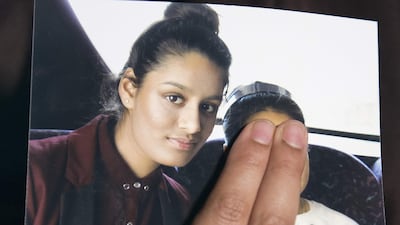British-born extremist Shamima Begum sums up a quandary facing the countries abandoned by fighters who pledged allegiance to ISIS. In an interview with The National, the UK's Middle East minister Alistair Burt addressed the dilemma of what to do with returning ISIS fighters, their wives and children. But it was his omissions that most instructive. Ms Begum would receive a fair trial "if she makes her way to a border and makes her way back to the UK", he said, without elaborating on how she might get there. It suggests that Britain has absolved itself of responsibility for the 19-year-old mother – who joined ISIS at the age of 15 – unless she washes up on its shores. That leaves her at the mercy of traffickers or worse, in danger of disappearing altogether, perhaps to enlist with other extremists.
While many in her homeland would understandably baulk at their government putting her on a plane home, the alternative is far worse. Setting aside the innocence of her newborn baby, there are myriad terrorist groups that would leap at the opportunity to recruit a high profile female ISIS recruit.
For Britain to bring Ms Begum to justice, it needs to deliver her to a courtroom in the first instance. In the confines of custody, she can be monitored, coaxed to release vital information and hopefully de-radicalised. Having experienced four years under ISIS, buried two children and fled to the camp where she currently languishes, Ms Begum’s experience could even act as a deterrent to other young women. Moreover, she is a mine of information about life under ISIS and its recruitment tactics.
As with Saajid Badat from Gloucester, England, who backtracked from his plan to blow up a US-bound passenger plane in 2001 and co-operated with authorities, securing the convictions of Al Qaeda operatives, Ms Begum’s evidence could help jail other extremists and even foil atrocities.
One thing is certain: a softer approach must be taken with ISIS children, many of whom were born in captivity and witnessed atrocities but all of whom are blameless. Russia is leading the way on this. Earlier this month, 27 children who lived under ISIS in Iraq were flown to Moscow to be rehabilitated with family members and counselled to talk about their experiences.
It shows an awareness that children should not be made to suffer for the crimes of their parents.
ISIS’s so-called caliphate spanned international borders – and so does this challenge. While Iraq’s government is actively prosecuting ISIS members within its territory, those in Syria are in the hands of the Syrian Democratic Forces, who are not equipped to deal with them in the long-term.
Ms Begum is one such case – but there are thousands more like her. The stakes are high, because what becomes of her and her infant son could become a template for all countries facing the return of dangerous ISIS members.

